- Home
- Simon Kernick
The Murder Exchange Page 4
The Murder Exchange Read online
Page 4
I thought about moving the body somewhere less conspicuous, but without gloves it wasn’t an option. I was just going to have to leave all three of them there and front it out. It was the only thing I could do, at least for the moment. Maybe Joe would have some ideas.
The damage to the car was superficial: two small holes in the window, surrounded by spider-web cracks. I could knock the whole thing out and replace it easily enough. Fowler had bled inside a little bit but not as badly as might have been expected.
I shut the door, went round switching off all the lights, then walked back round to the driver’s side. The keys were still in the ignition so I got in and backed out of the warehouse, before dragging the two doors shut and hoping above hope that no one opened them again for a long, long time.
Now there was only one thing left to do. I jumped back in the car and drove slowly down the road, following the route we’d come in on, until I got to the bush in front of Canley Electronics where Fowler had hidden the briefcase. I stopped the car and, leaving the engine running, jumped out. This was one mystery I could at least solve. I paused for a moment and listened. Still no sound, bar the continued hum of city traffic and the odd call of a night bird. High in the sky a three-quarter moon stared impassively down, unmoved by the events below.
I jogged up to the bush and knelt down where Fowler had been only minutes earlier, then reached into the foliage and felt about, knowing that I was in the right place because I’d been careful to watch him earlier.
My hand touched something solid. A handle. Bingo. I pulled it out, feeling an irrational excitement. I had to know what was so important that men I knew, men I liked, had had to die for it. I stood up, located the two catches on either side of the handle, and went to press them.
Which was when I heard the sound: a scrape of a shoe on gravel behind one of the two parked cars in front of the Canley Electronics building, only ten yards away. I thought I saw something move. I looked more closely, feeling myself tense. And then I saw him, a man in dark clothing and a baseball cap, face obscured by a scarf, moving about in the shadows. Those were the only details I can remember. I was too busy looking at the rifle nestled against his shoulder, the rifle that was now pointing straight at my head.
There was a hiss as a bullet flew above me, almost parting my hair, and struck something behind with a metallic clang. Immediately, I ducked down behind the hedge and ran, crouching, round to the driver’s side of the car as more rounds spat through the air. As I pulled open the door, I chucked the briefcase into the passenger seat, accidentally biting my tongue as a bullet passed right through the car and out the open driver’s-side window before ricocheting off the wing mirror. I ripped the Glock out of my waistband and cracked off my last two shots at him as he came round the front of the hedge and into view.
I was sure they’d both missed their target but they forced him to dive behind the bush and temporarily out of sight. Without waiting for him to reappear, I jumped into the car, rammed it into gear, and drove out of there as fast as I could, not bothering to look round or stop when I came to the barrier. I hit it full-on, broke it in two, and carried on going.
I reckon I’d only gone a matter of a few hundred yards when the intense curiosity I was feeling got the better of me. Even though I could hear the sound of sirens closing in in the distance, even though I knew I was taking a huge and needless risk, I couldn’t resist pulling over and picking up the briefcase. Once again, I located the catches and this time got the opportunity to press them. They both clicked satisfyingly and the case came open.
I stared for maybe three, four seconds, feeling confused, unable to fully comprehend what I was seeing.
Because, you see, after all that, the fucking thing was empty.
Friday, sixteen days ago
Gallan
The murder of Shaun Matthews, thirty-one, of the Priory Green Estate in Islington was an odd one from the start. Matthews had enemies, there was no doubt about that. Three months before his death he’d been threatened by two men he’d thrown out of the Arcadia nightclub in Holloway where he worked as chief doorman. One of the two, later identified as twenty-eight-year-old Carl Voen, had claimed that he was going to come back and blow Matthews’s head off. This might not have been taken seriously had it not been for the fact that Voen had a previous conviction for possession of a firearm and two further convictions for grievous bodily harm. He was, by most accounts, a man with a short fuse. He was also, unfortunately, a man with a watertight alibi for the time of death. For at least twelve hours either side of the point at which Matthews had shuffled off his mortal coil, he’d been in custody undergoing questioning about an armed robbery, with the questioning being carried out by two of the detectives who were now investigating the murder.
Shaun Matthews was also a drug dealer. According to anecdotal evidence collated by investigating officers, he supplied Ecstasy, cocaine and, on at least one occasion, heroin to Arcadia clubgoers (apparently in collusion with the club’s management), as well as to individuals visiting his flat. According to more than one source, he had also earned himself something of a reputation for selling below-par products, particularly when operating off the premises. There was a story doing the rounds that one unlucky punter had challenged Matthews about an especially poor batch of cannabis he’d sold him only to have Matthews dangle him by the ankle from the third-floor balcony of his flat while simultaneously slashing his buttocks with a Stanley knife. The punter had needed more than forty stitches on his behind and he, too, had left the hospital muttering words of dark revenge against the man who’d made it so difficult for him to sit down in comfort for months to come.
Nothing about any of this was odd, of course. There are plenty of criminals out there who fail to recognize or abide by even the most rudimentary facets of capitalism, and insist on riding roughshod over their customers and making enemies as casually as old ladies make cups of tea. Sometimes, inevitably, they end up dead, and usually the people doing the killing are those they’ve wronged, but in Matthews’s case there appeared to be more to matters than initially met the eye.
For a start, it had taken two days to conclude that he’d been murdered. Matthews was what a tabloid report might describe as a ‘strapping’ young man: six feet two, sixteen stone of mainly muscle, very fit (at least superficially) as a result of his daily visits to the gym, and no history of medical problems. Therefore when he was found dead in his bed one morning by police officers who’d been called by a colleague from the Arcadia who was concerned that he hadn’t turned up at work two evenings running, it came as something of a shock to all concerned. Not, perhaps, that he was dead but more that there didn’t appear to be any obvious cause. There were no external injuries and no sign of any kind of a struggle. Matthews was lying on his back, with the covers half off him, and his head tilted to one side. The expression on his face was what the first officer on the scene had described as restful. Not fearful, angry, or even shocked. Just restful. His arms were stretched out to his sides with the fists lightly clenched, and he was naked. It looked like death by natural causes, or possibly some sort of drugs overdose.
Matthews’s body was taken away for a post-mortem, and this was when things got interesting. For all his strength and build, in actual fact he probably didn’t have long to live. He had a serious heart condition, thought to have been brought on by an addiction to steroids. There were traces of nandralone in his blood, as well as cocaine and alcohol, and injection marks on his left arm. Initially, the pathologist thought that he’d had a heart attack, but unfortunately such a diagnosis didn’t explain the strange internal injuries Matthews had suffered. There’d been extensive internal haemorrhaging as well as a cloudy swelling in the cells of a number of organs, particularly the kidneys. Somewhat baffled, the pathologist had carried out further tests. These showed significant traces of an extremely potent neurotoxin that would have resulted in these injuries and were, almost certainly, the cause of death. And this was the thing. T
he poisons department at Guy’s Hospital were called in and quickly identified the neurotoxin as elipadae, or cobra, venom.
Snake poison. Hardly the work of your average lowlife thug, the type Shaun Matthews specialized in upsetting. Which left what? The neighbours all agreed that Matthews received a fair number of visitors which, given his alleged trade, wasn’t particularly surprising, and it was felt that one of them was the likely perpetrator. Where your average small-time drugs buyer was likely to have got hold of cobra venom, however, was anyone’s guess.
The case was an odd one, and as far as I was concerned odd equalled interesting, and interesting equalled challenging, which these days can be something of a rarity. Never underestimate the stupidity of criminals. Most of them’ll make every effort imaginable to get caught. In the last murder investigation I’d been involved in, ten weeks earlier, the murderer, a seventeen-year-old carjacker named Rudi, had stabbed an unfortunate BMW owner to death when he’d had the gall to try to prevent his car being taken. Rudi had been arrested three days afterwards when a passing patrol car had spotted the vehicle parked outside his mum’s flat. Further investigation had unearthed Rudi’s prints all over the interior, as well as those of two of his mates. The knife he’d used, still complete with somewhat telltale blood-stains, had turned up under his bed hidden in a PlayStation box. I reckon the paperwork took up more time than the detective work. Sherlock Holmes wouldn’t even have bothered getting out of bed, and who could blame him?
But this was different. A poisoning opened up all sorts of possibilities. It suggested interesting motives. It suggested intelligence, or at least creativity, on the part of the poisoner, but also an incredible naivety. Poisoning was, in general, a pretty foolish method of committing murder. It was too easily traceable these days which meant its one great advantage – that it could make the victim’s death look like an accident – no longer held true. Having said this, however, the case was now six days old (or at least the murder was) and had yet to throw up any real clues of note, or anything that pointed to one particular person.
It was a fine sunny morning, the fifth day of what passes for an English heatwave, and DC Dave Berrin was driving as we pulled into the walled car park at the rear of the Arcadia nightclub, an imposing post-war structure on the Upper Holloway Road which dominated the corner on which it stood, and parked in a bay marked STAFF ONLY.
Not surprisingly, the club was closed at this time in the morning, but we were expected and walked right in through the double doors at the front. The interior was dark and spacious with tables facing down on to the dance floor on three sides. At the opposite end of the room was a long bar lined with stools. A woman stood on the serving side of it with a pen in her hand, looking down at some papers in front of her. She appeared to be the only person in the place. She looked up when she heard our footfalls on the wooden floor.
‘Sorry, we’re closed,’ she shouted out, going back to her papers. ‘We open at twelve for lunch.’
‘We’re police officers,’ I said loudly, crossing the dance floor with Berrin in tow. ‘Here to see Mr Fowler.’
‘He’s not here,’ she shouted back.
‘He should be. He’s expecting us. We’ve got an eleven o’clock meeting.’
‘Well, he’s not here.’
I strode up the steps to the bar and stopped in front of her. She carried on making notes on the papers on the bar. ‘Perhaps, then, you can tell us where he is.’
She looked up with a faintly bored expression on her face. ‘I don’t know. He should have been here more than an hour ago.’
This one had an attitude, all right. I gave her a quick once-over. Early thirties, slim with well-defined features, a nose that was maybe a little too sharp, and a vaguely Mediterranean appearance, particularly the olive-coloured eyes. She was definitely attractive – very attractive – but in a hard, don’t-mess-with-me kind of way, with the cynical confidence of someone who’s not afraid of a fight. If we’d been Nazi stormtroopers, we wouldn’t have intimidated her. My ex-wife’s all-time favourite film is Gone with the Wind and I think that says something about her (though I’m not quite sure what). This girl looked like hers was Scarface.
‘Is he likely to be at home?’ I asked her.
‘I told you, I don’t know where he is.’
I sighed ostentatiously. ‘But I presume you’ve got his home phone number?’ She nodded. ‘Well, I’d appreciate it if you’d phone him then and tell him we’re here.’
‘Look, I’m very busy.’ She motioned to the notes in front of her.
‘So are we, Miss … ?’
‘Toms. Elaine Toms. I talked to a couple of your officers the other day.’
‘Well, we’re very busy too and it would be greatly appreciated if you could phone Mr Fowler and see if he’s at home for us. It won’t take a minute.’
My tone was even but firm, the kind that says I’m going to keep going until I get some co-operation. It always works in the end, but you’d be amazed how many people take a long time getting the message.
Without a word she turned and walked over to a telephone pinned to the wall in the corner, and dialled a number. I was a bit pissed off because I’d been preparing for this interview for close to a day now. We’d talked to Fowler once but only briefly to ascertain his position within the nightclub, what his relationship was with the deceased, and whether he could throw any light on what had happened. He’d come across as very keen to appear as helpful and as friendly as possible, but hadn’t actually managed to tell us a great deal. Predictably, he’d denied knowing anything about Matthews’s involvement in drug dealing. He’d claimed that as Arcadia’s owner he didn’t tolerate drug use on the premises but was aware that it did occur. ‘I’m looking at ways to combat it,’ he’d said, and had talked about installing cameras in the toilets. ‘That’s where most of it goes on, I’m sure,’ he’d added – a fairly logical assumption. Neither Berrin nor I had found the interview very helpful, mainly because there was something not quite authentic about Fowler’s answers, and since then it had come to light that he had a conviction for conspiracy to supply Class A drugs in the late 1980s and that one of his co-conspirators at the time had been Terry Holtz, the late brother of a notorious local crime figure. He’d also been done for driving under the influence of cannabis a couple of years back, and the club had been raided on two separate occasions by the Drugs Squad in an effort to take out suspected dealers, the last time eighteen months ago, although it had to be said that on neither occasion was any contraband found. More promisingly, there was also a rumour doing the rounds that, although Fowler’s name was on the deeds of the club, he wasn’t what you’d call the real owner. That man, it was claimed, was one Stefan Holtz, the same local crime figure whose brother Fowler had once been involved with.
The feeling in the station’s CID was that the motive for this murder was almost certainly drug-related and that it might possibly be something to do with a disagreement between Fowler and Matthews. Since Fowler apparently owned the club, and was almost certainly lying when he said he didn’t tolerate drugs on the premises, and Matthews appeared to have been the chief dealer, it was probably down to an argument about something mundane like the split of profits. All this was conjecture, of course, but DCI Knox, the head of the investigation, specialized in conjecture. Me, though, I wasn’t so sure, not least because I didn’t think Fowler would have used an obscure poison to rid himself of a troublesome business partner. But I did think there were plenty of questions he could provide an answer for, particularly regarding the possible involvement of the Holtzes, and I was keen to hear them.
But it seemed I was going to have to wait a little longer.
‘He’s not there,’ said Elaine Toms, coming back to the papers on the bar. ‘Either that or he’s not answering.’
‘Have you got his address?’ She nodded, and wrote it down on a piece of paper. I took it, thanking her, and put it in my pocket. It was local. ‘And what’s your position here,
Miss Toms?’
‘I told you, I’ve already been interviewed about the murder.’
‘Well, we’re talking to you again. I’d just like to refresh myself of your account.’
‘It was a DI I talked to.’
‘DI Capper. Yes, I know. Now, if you’ll answer the questions.’
‘Have you got any ID?’
She was trying to be difficult but I wasn’t going to argue about it, so I took out my warrant card and showed it to her, as did Berrin. She inspected them both carefully, paying particular attention to mine. ‘It’s not a very good photo of you,’ she told me.
‘With me, the camera always lies,’ I said. ‘Now, your position?’
‘I manage the place.’
‘And how long have you been here for?’
‘Just over a year. I joined last July.’
‘You knew Shaun Matthews pretty well, then?’
She sighed theatrically. ‘Yeah, I knew Shaun Matthews pretty well. You know, I’ve said all this before.’
‘Humour me. I presume you knew he dealt drugs?’
‘Are you asking me or telling me?’
‘I’m asking you.’
She shrugged. ‘I heard that he did some dealing here and there and that he might even have done some in this place, but I never saw him do any and I never saw anyone else take any stuff either. Occasionally you get someone off their face, but if they get like that we don’t serve them and we chuck them out. They’re certainly not sold the stuff in here. I only heard Shaun was meant to be this big-time dealer after he died.’
‘You’re sticking to the party line, then? That Arcadia’s pretty much drug free and that you don’t go in for that sort of thing here.’

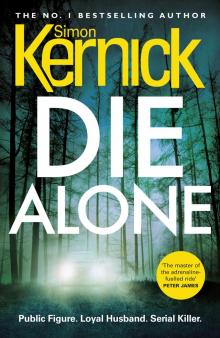 Die Alone
Die Alone Deadline
Deadline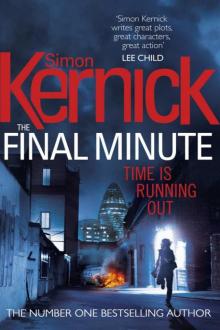 The Final Minute
The Final Minute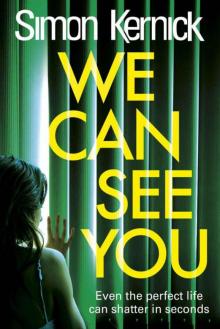 We Can See You
We Can See You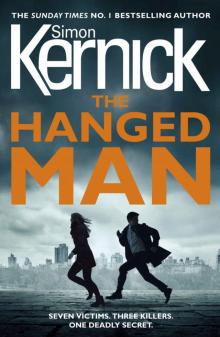 The Hanged Man (Bone Field 2)
The Hanged Man (Bone Field 2)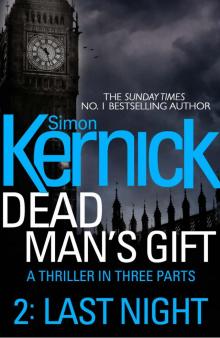 Dead Man's Gift 02 - Last Night
Dead Man's Gift 02 - Last Night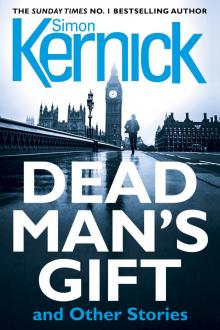 Dead Man's Gift and Other Stories
Dead Man's Gift and Other Stories A Good Day To Die
A Good Day To Die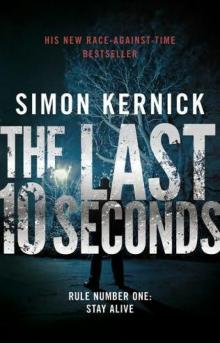 The Last 10 Seconds
The Last 10 Seconds The Murder Exchange
The Murder Exchange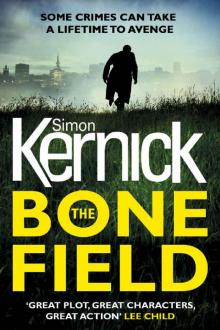 The Bone Field
The Bone Field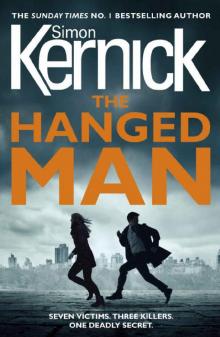 The Hanged Man
The Hanged Man Target
Target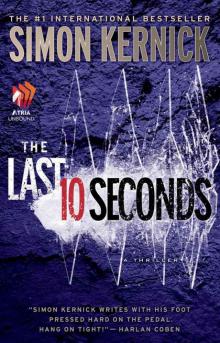 The Last 10 Seconds: A Novel
The Last 10 Seconds: A Novel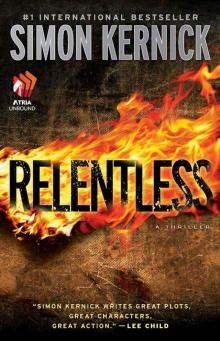 Relentless: A Novel
Relentless: A Novel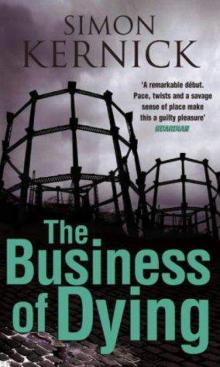 The Business Of Dying
The Business Of Dying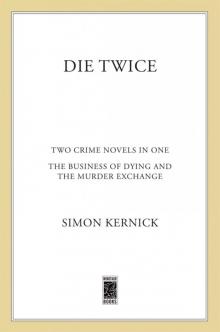 Die Twice
Die Twice Flytrap
Flytrap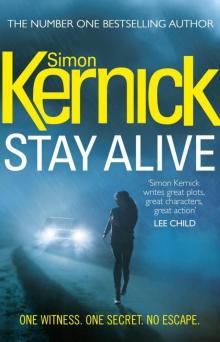 Stay Alive
Stay Alive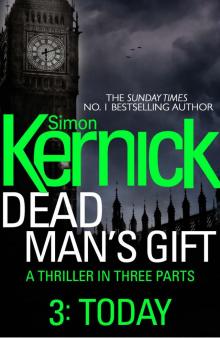 Dead Man's Gift 03 - Today
Dead Man's Gift 03 - Today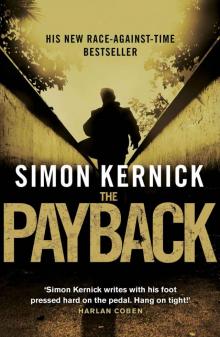 The Payback
The Payback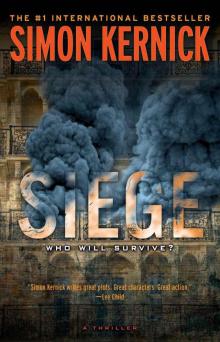 Siege: A Thriller
Siege: A Thriller The Crime Trade
The Crime Trade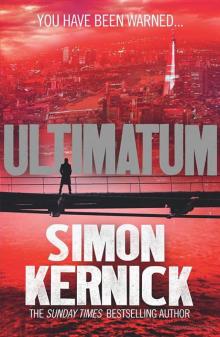 Ultimatum
Ultimatum